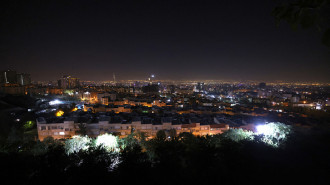'Visa for workers': Spain's new border policy angers Moroccan cross-border workers
After two years of biding, Moroccan cross-border workers in Ceuta and Melilla are dismayed over Spain's new selective policy that may deprive many of job opportunities in the enclaves.
“As of Tuesday, May 31, legally recognised cross-border workers will be able to enter Spanish territory through these same steps, as well as those who, due to the expiration of the card that accredits them as such, have obtained a specific visa for Ceuta and Melilla,” Spain's Ministry of Interior announced last week.
Laying along the boundary between the Mediterranean Sea and the Atlantic Ocean, Ceuta and Melilla are two Spain-controlled enclaves that represented, for decades, a gate to job opportunities for thousands of Moroccans.
The frontiers of the two cities were first shut in the spring of 2020 because of the coronavirus pandemic and stayed closed during the Spanish-Moroccan diplomatic crisis.
However, after reconciliation between Rabat and Madrid, the borders opened exclusively for European passport holders in the first hours of Tuesday. They are set to open for workers at the end of May.
The newly announced conditions threaten to exacerbate a crisis facing of thousands of Moroccan cross-border workers.
Saida, a Moroccan cross-border worker in Ceuta for more than seven years, said many of her colleagues have lived on money made through selling their furniture in the past two years, in a bid to survive their financial plight. "Some people could not afford food for their families during the crisis [borders' closure]," she said.
“We were trapped in Morocco after the closure of borders. Therefore we were not able to renew our work permits. And now they are asking us for visas. This whole procedure does not consider our situation or respect our rights as workers,” Saida added in her statement to The New Arab.
Before the pandemic, Moroccan cross-border workers used to access the Spain-controlled cities by “pasos fronterizos”, which guaranteed them legal work in the enclaves, with the condition to return to Morocco at the end of the workday.
Due to the new conditions, some 8000 Moroccan cross-border workers with invalid work permits will not be able to go back to their jobs, according to the Moroccan Union of Workers (UMT).
On Sunday, UMT, The largest union in the Moroccan kingdom, held an urgent meeting with thousands of cross-border workers in reaction to the newly announced rules.
The union, which voiced its opposition to the so-called “visa for workers,” called on the Spanish government to allow the access of cross-border workers with invalid work permits to renew their documentation.
“They [Moroccan cross-border workers] should be given a period ranging between one and two months of access to the enclaves to be able to renew their papers,” said Chakib Marouan, a spokesperson of Moroccan cross-border workers in Ceuta, during Sunday's meeting
Some Moroccan cross-border workers said they have sought to get "the workers' visa" Madrid’s interior ministry has announced. To their surprise, they have been told that there's no such thing.
"I went to the consulate to ask about the procedure to get the special visa for workers. They told me there is no visa for cross-border workers. So, we do not know now what visa the ministry was talking about,” Ali, a Moroccan worker, told The New Arab.
The union blamed the ambiguity of the new rules on the Moroccan government’s lack of interest and communication regarding this issue.
“The Moroccan government and authorities are required to communicate with representatives of the cross-border workers, especially in light of the uncertainty and rumours that have become circulated in the arena regarding the adoption of 'visa', and other news and information,” said Abdelhay El Amrani, a member of the Moroccan Union of Labor, during the meeting.
The Moroccan government has not officially reacted to Spain's newly announced conditions for cross-border workers' access to the enclaves.
Meanwhile, the union said it would hold peaceful protests within Morocco's borders if Spain goes ahead with applying the new access rules.
“Let's go to the borders, if they do not let us, we are going to do something,” announced the spokesperson of UMT in Sunday's meeting.

![Palestinians mourned the victims of an Israeli strike on Deir al-Balah [Getty]](/sites/default/files/styles/image_684x385/public/2024-11/GettyImages-2182362043.jpg?h=199d8c1f&itok=xSHZFbmc)


![The law could be enforced against teachers without prior notice [Getty]](/sites/default/files/styles/image_684x385/public/2178740715.jpeg?h=a5f2f23a&itok=hnqrCS4x)
 Follow the Middle East's top stories in English at The New Arab on Google News
Follow the Middle East's top stories in English at The New Arab on Google News
![Thousands of people have fled from Lebanon to Syria as a result of Israel's war [Getty]](/sites/default/files/styles/image_330x185/public/2024-11/GettyImages-2180619380.jpg?h=199d8c1f&itok=q4PK1BtW)

![Anwar Ibrahim (centre) said that Malaysia would support the Palestinian people against Israel's genocide [Getty]](/sites/default/files/styles/image_330x185/public/2024-11/GettyImages-1742690206.jpg?h=69f2b9d0&itok=ZYgNyRPM)